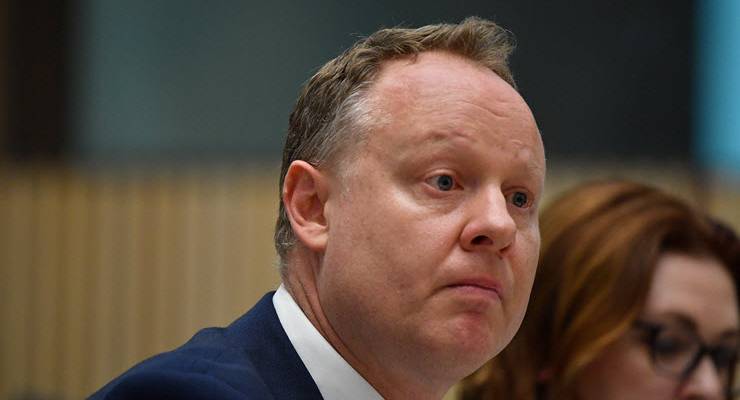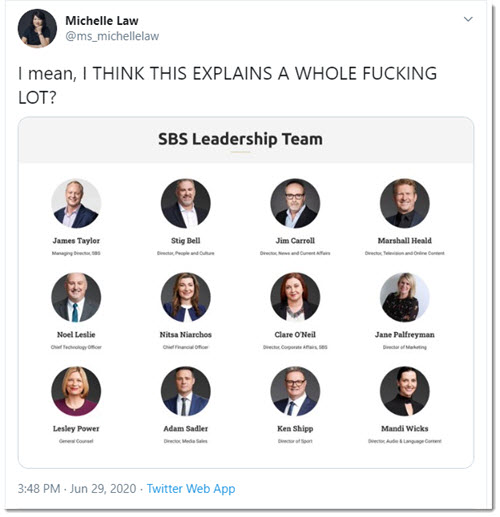
A long overdue conversation about racial and cultural diversity is slowly washing through the Australian media.
And SBS, the multicultural broadcaster, where diversity is baked into the charter, is the latest news organisation to apparently fail the test.
Yesterday, several non-white journalists recounted experiences of racism and microaggressions at the broadcaster. An image, which spread like wildfire over social media, suggested an overwhelmingly white leadership team, more evidence that the country’s multicultural broadcaster may have a real diversity problem.
Journalists speak out
In a series of widely-shared Twitter threads, Indigenous writer Kodie Bedford recounted years of racism, workplace bullying and microaggressions during her time at SBS.
Bedford said Indigenous reporters were made to undergo additional grammar training, had their accents criticised, and their articles and scripts edited line by line in front of them.
“We felt like dopey blackfellas in the corner, ticking boxes,” Bedford wrote.
Other non-white journalists recounted negative experiences at SBS. Guardian Australia podcast host and former SBS Indigenous cadet Laura Murphy-Oates recounted experiencing racialised comments about her voice, toxic managers, and a news and current affairs leadership team that was entirely white.
Several other journalists raised examples of microaggressions in their interactions with SBS.
The unbearable whiteness of leadership
In a speech delivered late last year, SBS managing director James Taylor hit out at a lack of diversity across the media sector.
“As a media industry, we need to move away from a tick-box approach of inserting diversity into stories, and instead focus on sharing more nuanced stories that simply reflect the diversity we experience in our lives every day,” Taylor said.
In a separate address, he took a subtle dig at the ABC’s own recent diversity push, which he called “a bit of noise”. The subtext was clearly that the ABC was finally catching up.
But while 40% of staff at the broadcaster speak a language other than English at home, there are concerns this diversity isn’t being reflected at more senior levels.
As Bedford’s threads were picking up traction, writer Michelle Law, who is an outspoken critic of the whiteness of Australia’s media and culture sectors posted a picture of the SBS leadership.
All the faces appear to be white.
According to the SBS charter, the broadcaster must “contribute to the overall diversity of Australian broadcasting and digital media services”.
But former SBS CEO and managing director Michael Ebeid, the first person from a non-European background to take the helm, urged caution before calling out a lack of diversity in leadership.
“Diversity is not always about colour, and if you look at the leadership team, there’s a lot of diversity in terms of country backgrounds,” Ebeid told Crikey.
Ebeid pointed to Taylor’s Italian heritage, and chief financial officer Nitsa Niarchos, who is of Greek background, as examples of cultural and linguistic diversity on the leadership team.
Ebeid also urged critics of the broadcaster to look at the content it was producing and the unique stories that were being told.
“Look at the stories they’re running, look at the evening news,” Ebeid said
“Just because you don’t have somebody of colour, doesn’t mean you can’t put together an awesome drama series or news story.”
However UTS emeritus professor Andrew Jakubowicz, a former SBS board member, said there had always been tensions between the SBS Board and management about diversity issues.
Ultimately, Jakubowicz believes a lack of non-white people in SBS’ upper echelons had helped entrench a lack of diversity in leadership.
“Management tends to reproduce itself because it feels comfortable with people it understands and knows,” Jakubowicz says
“To change an organisation, the people who make decisions have to feel the issues. Until that community around the table making the decisions is diverse, the decisions aren’t going to be diverse.”
Does SBS need to do better on diversity? Let us know your thoughts by writing to letters@crikey.com.au. Please include your full name to be considered for publication in Crikey’s Your Say column.









“Management tends to reproduce itself because it feels comfortable with people it understands and knows,”
This is an indictment of an organisation, although a fair description of the way organisations behave
We should be appointing people who make us feel uncomfortable, as this is usually because they challenge us and won’t just slot in to doing what everybody else has done for years. One of the best appointments I ever made was made exactly because the person was the one who made me feel uncomfortable.
It is only by deliberately doing such things that we have any hope of building an understanding of stuff like unconscious bias and stereotyping into the system.
Of course the last thing that the modern MBA/Grad Dip Management managerial muppet type wants is people who are going to challenge and rock the boat
“Bedford said Indigenous reporters were made to undergo additional grammar training, had their accents criticised, and their articles and scripts edited line by line in front of them”.
Public presentation is a valuable skill with which vanishingly few people are born ready formed. Successful presenters work hard on their mode of delivery to maximise effective communication. This includes copping and dealing with criticism.
Any mass media presenter who thinks they are entitled be tolerated with bad grammar and poor pronunciation should be shown the door. There are plenty of better candidates ready to do the job.
So why did only the indigenous presenters get lined up for grammar and diction lessons?
It is not as if most of the rest of us are brilliant at it either.
I am a fully paid up grammar/spelling Nazi and it does irritate me when I see blatant errors, but this is how real, fallible people speak in the real world.
Was this a genuine attempt to improve presentation ( if so it would have been “all in” and inclusive) or was it the usual not so subtle way of putting people in their place by slamming their grammar and diction, much of which also has a class bias? In this case probably a racial bias as well.
psst, don’t speek abowt pore grama or shpeling on Creeky.
As long as the meaning and implications are clear, one needs a sense of proportion in responding 🙂
I recall some years back the changing requirements for translators in hospitals and other settings struggled with the Italian / Greek control and the growing numbers of Asian, Middle Eastern and other groups. I think a similar struggle is emerging at SBS as the ‘traditional’ leaders from Euro backgrounds resist the moves to POC programming at scale. I think SBS is too white in its programming, too much European product and not enough from other parts of the world. Their forays into food channels, and Viceland only reinforce their incredibly Europhile view of the world.
So true and that’s just the start. It’s a constant battle in all media to raise standards and then maintain them against the resistance of presenters who feel entitled to go their own way with any old tosh. This is what media management should be about. One person’s gripes is another persons opportunity to learn and improve.
When I hear “microaggression” I hear manipulative political agenda. Fair enough to fight to climb the greasy corporate pole but don’t slide back down into the mud and take others with you.
This reply is meant for Mr Phullpot.
The problem is that it your “manipulative political agenda” is somebody else’s “microaggression”, microaggression which is very effective at keeping people in their place.
Get with the programme!
Microaggression is so old hat, now there is the concept of nanoaggression AND it being unconscious makes it somehow even more sinful.
As the roll call of victims grows, reality recedes.
Get serious
This is real and hurts real people
Clearly not you though, so it probably doesn’t matter
5 out of 12 being women is pretty good though.
Had it always been this way? I was under the impression that SBS was under pressure some years, even decades, ago to become less ‘multicultural’, compromising content and possibly be set up to merge with the ABC aka LNP/NewsCorp/IPA ‘wrecking crew’?
Fact is diverse work forces or employees managed by white Anglo/Irish (and lesser extent European) management seems to have become the cultural norm in Australian organisations, including politics and media, reflecting their twilight as the baby boomer bubble passes on….back grounded by angst directed at urban elites, ‘Melbourne’ etc.?